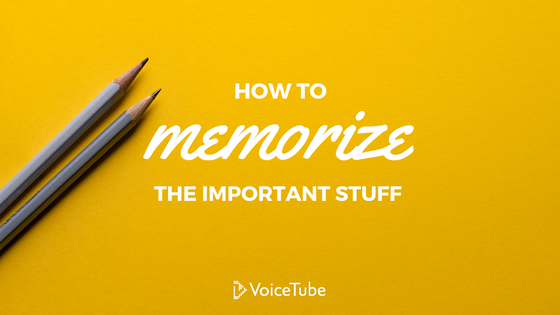Memorizing can be a pain in the neck but, when used correctly, these techniques will help you memorize important things and improve your English skills.

Everyone seems to agree that effective language learning demands much more than just memorizing words. A good student must be able to understand and apply different concepts according to the situation, and to think critically about the language. But sometimes we simply don’t have a choice: when it comes to things like vocabulary and certain grammar rules, we often have to rely on memorization to get it right.
So while your studies shouldn’t depend only on memorization, there’s a great deal of things you’ll be forced to know by heart. This is why it’s so important to use the right techniques, like mnemonics and flashcards — and to use them correctly.
Flashcards: old but gold
Using flashcards has always been a popular method to help students remember important things. It was probably used by your parents and grandparents when they were younger, but that shouldn’t be a reason to dismiss this technique as outdated. Never heard of flashcards? Here’s how they work:
Here are a few reasons why you should consider using flashcards to learn English:
- It’s cheap: it costs only a pen and paper — which you probably already have. If you don’t happen to have these items right now, you can certainly find cheap options at any supermarket or dollar store.
- Handwriting is more effective than typing: research has shown that students who hand-write their notes are more likely to remember and understand the contents of a lecture, in comparison with students who type it all down on their laptops. Likewise, flashcards can help you internalize the content as you write them.
- You learn other skills in the process: creating good flashcards demands you to be concise (to explain a concept using few words) and to exercise critical thinking (to figure out what keywords should be used and which parts need to be highlighted).
If you are using flashcards to remember new or uncommon words in English, keep it simple: write that specific word on one side of the card, and its meaning (in your native language) on the other side. If it’s a word that does not have a direct translation in your language, you can write its definition in English on the back of the card.
Don’t know which words to put in the flashcards? Start by using the Word Bank function on VoiceTube; simply select all unknown words while watching videos and save them. After a couple of days, go back to your Word Bank and see which words you still find difficult to remember. These are the words you should be focusing on, so create a flashcard for each of them.
Mnemonics: the key to memorize sequences
Flashcards are good if you need to remember synonyms, facts, definitions, etc. However, if you need to memorize slightly more complex information, such as a sequence of words or numbers you might need to use mnemonics instead. This is how they work:
Mnemonics are a great way to remember those grammar rules that impose a certain order among elements. Think of the order of adjectives in English, for example: if we have to organize the adjectives “green” and “small” when describing a tennis ball, we would always have to say it’s “a small green tennis ball”, but never “a green small tennis ball”.
The problem is that while native speakers know this instinctively, most of us English learners have to memorize the order of adjectives. As the tweet below shows, the order should be: opinion-size-age-shape-colour-origin-material-purpose, then the noun.
Things native English speakers know, but don’t know we know: pic.twitter.com/Ex0Ui9oBSL
— Matthew Anderson (@MattAndersonBBC) September 3, 2016
So here are a couple of tips to remember the order of adjectives in English:
- Create your own! Try to create one or two sentences using all of the categories. For example: I have an awesome little 20-year-old sister; she bought me a rectangular green Italian leather travel bag.
- Use the acronym OSASCOMP and try to remember what each initial stands for.
Do you have another mnemonic to help you remember grammar rules in English? Share your tip on the comment section below!
